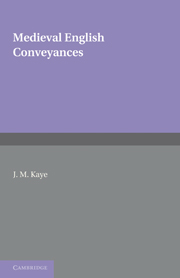Book contents
- Frontmatter
- Contents
- Preface
- Abbreviations and references
- List of year book cases
- Introduction
- 1 Common clauses in deeds
- 2 Grants in fee: general
- 3 Grants in fee: special cases
- 4 Grants in marriage, limited fee and fee tail
- 5 Grants in alms
- 6 Women's realty
- 7 Confirmations
- 8 Grants for life and for lives
- 9 Grants for terms of years
- 10 Rents
- 11 Exchanges
- 12 Surrenders and releases
- 13 Villeins and their lands
- Glossary of legal terms
- Select Bibliography
- Index
7 - Confirmations
Published online by Cambridge University Press: 29 January 2010
- Frontmatter
- Contents
- Preface
- Abbreviations and references
- List of year book cases
- Introduction
- 1 Common clauses in deeds
- 2 Grants in fee: general
- 3 Grants in fee: special cases
- 4 Grants in marriage, limited fee and fee tail
- 5 Grants in alms
- 6 Women's realty
- 7 Confirmations
- 8 Grants for life and for lives
- 9 Grants for terms of years
- 10 Rents
- 11 Exchanges
- 12 Surrenders and releases
- 13 Villeins and their lands
- Glossary of legal terms
- Select Bibliography
- Index
Summary
GENERAL
A confirmation was a ratification, given to a person seised of a legal estate, by some person who had rights over that estate. Unlike a release, by which a person gave up some or all of his rights for all time, a confirmation usually left the confirmor with his rights, but acted by way of estoppel, preventing him and his heirs from exercising those rights adversely to the interests of the confirmee. When a confirmation was made of a grant, it was meant to perfect what otherwise would have been seen as an imperfect or incomplete transaction. Confirmations were made throughout the medieval period, but most of those which survive come from the period ending in the late thirteenth century, after which there was a considerable fall off. One reason for this was that legal developments in that century had the effect of making it unnecessary to obtain confirmations in some cases where they had previously been usual. Another reason was that from the early thirteenth century onwards there was a growing tendency for grantees to obtain releases, rather than confirmations, from lords, heirs and others who had or might have had rights over the property granted. Bracton's discussion of the subject forms a watershed between the old attitudes to confirmations and the new, for he ignored the practice of the previous century, although it was by no means dead in his time, and concentrated on legal issues which were to form the basis of Year Book learning in the next century when confirmations shifted to a large extent from the plane of tenures into that of estates.
- Type
- Chapter
- Information
- Medieval English Conveyances , pp. 209 - 235Publisher: Cambridge University PressPrint publication year: 2009

